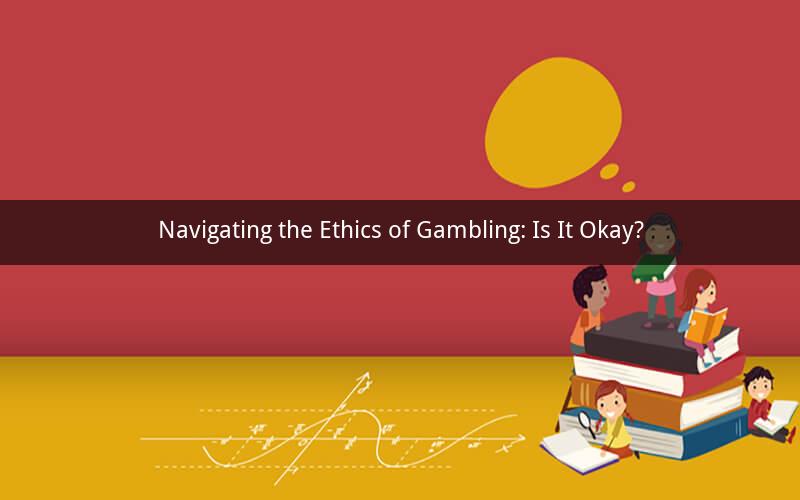
Gambling has long been a subject of debate, with many questioning whether it is morally acceptable. This article explores the various perspectives surrounding gambling, examining both its potential benefits and drawbacks. We delve into the ethical considerations, societal impacts, and personal consequences associated with gambling, providing a comprehensive understanding of the topic.
1. Ethical Considerations
Ethical debates often revolve around the concept of fairness and the potential for harm. Proponents argue that gambling can be morally acceptable when it is based on chance and fairness. They believe that as long as both parties are aware of the risks and enter into the agreement voluntarily, gambling can be considered a legitimate form of entertainment.
However, critics argue that gambling is inherently unethical due to its addictive nature and potential for harm. They contend that gambling can lead to financial, psychological, and social consequences, particularly when individuals become addicted. The argument against gambling is based on the idea that it exploits people's vulnerabilities and can lead to negative outcomes.
2. Societal Impacts
Gambling has significant societal impacts, both positive and negative. On the positive side, gambling generates revenue for governments, which can be used for public services, infrastructure development, and charitable causes. Additionally, it creates job opportunities in the gambling industry, including casino staff, sports betting companies, and regulatory bodies.
On the negative side, gambling can contribute to various social issues. Problem gambling, also known as gambling disorder, is a significant concern, as it can lead to financial ruin, family breakdown, and even suicide. Furthermore, gambling-related crime, such as fraud and theft, can have a detrimental impact on communities.
3. Personal Consequences
The personal consequences of gambling are profound, particularly for those who become addicted. Financially, individuals may experience significant losses, leading to debt, bankruptcy, and even homelessness. Psychologically, gambling addiction can cause depression, anxiety, and other mental health issues. Socially, problem gamblers may experience strained relationships, social isolation, and a loss of self-esteem.
4. Legal and Regulatory Framework
The legality of gambling varies by country and region, with some places legalizing and regulating it, while others ban it entirely. Those who support gambling argue that regulation is crucial to protect vulnerable individuals and ensure fair practices. Regulation includes age restrictions, mandatory self-exclusion programs, and responsible gambling initiatives.
Opponents of gambling argue that regulation is not enough and that the risks associated with gambling are too great. They advocate for stricter regulations or a complete ban on gambling activities.
5. Conclusion
The question of whether gambling is okay is complex and multifaceted. While some argue that gambling can be morally acceptable as long as it is based on chance and fairness, others believe that its addictive nature and potential for harm render it unethical. Societal impacts, personal consequences, and legal and regulatory frameworks further complicate the issue.
In conclusion, the acceptability of gambling depends on various factors, including individual values, societal norms, and the specific context in which gambling occurs. It is essential to consider these factors when evaluating the ethics of gambling.
Questions and Answers:
1. Question: What are the potential benefits of gambling for society?
Answer: The potential benefits of gambling for society include generating revenue for governments, creating job opportunities, and funding public services and charitable causes.
2. Question: What are the potential negative consequences of gambling for individuals?
Answer: The potential negative consequences of gambling for individuals include financial ruin, addiction, psychological issues such as depression and anxiety, and social problems like strained relationships and social isolation.
3. Question: How does the legal and regulatory framework affect the ethics of gambling?
Answer: The legal and regulatory framework can affect the ethics of gambling by ensuring fair practices, protecting vulnerable individuals, and mitigating the risks associated with gambling. However, opponents argue that regulation is not enough and advocate for stricter regulations or a complete ban.
4. Question: Can gambling ever be considered ethical?
Answer: Whether gambling can be considered ethical depends on individual values and the context in which it occurs. Some argue that gambling can be ethical when based on chance and fairness, while others believe its addictive nature and potential for harm render it inherently unethical.
5. Question: How can individuals determine if they have a gambling problem?
Answer: Individuals can determine if they have a gambling problem by assessing their behavior against common signs of problem gambling, such as preoccupation with gambling, lying to hide gambling activities, neglecting responsibilities, and experiencing financial, psychological, and social consequences as a result of gambling.